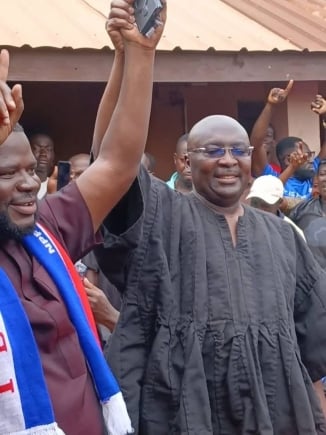The Akwatia Constituency by-election has emerged as a pivotal political battleground, drawing intensified campaigning from both the ruling New Patriotic Party (NPP) and the opposition National Democratic Congress (NDC). Triggered by the untimely demise of the incumbent Member of Parliament, Ernest Kumi, the by-election serves as a crucial test of voter sentiment and a significant barometer for the upcoming general elections. Former Vice President Dr. Mahamudu Bawumia spearheads the NPP’s campaign, emphasizing continuity and a commitment to carrying forward Kumi’s legacy. He has made multiple visits to the constituency, engaging with community members, attending church services, and paying respects to traditional leaders, all while championing the NPP’s candidate, Solomon Kwame Asumadu. Bawumia’s message centers on honoring Kumi’s memory through a decisive vote for Asumadu, portraying him as the rightful heir to the late MP’s vision for Akwatia.
The NPP’s strategy is rooted in maintaining the party’s hold on the constituency by presenting Asumadu, a 40-year-old licensed small-scale miner, as the natural successor to Kumi. They are relying on the legacy of Kumi’s work and the established connection with the electorate, hoping to capitalize on the sympathy vote following his passing. Asumadu, popularly known as Owusu, is being portrayed as a local figure intimately familiar with the needs and aspirations of the community. The NPP’s campaign highlights Asumadu’s commitment to continuing Kumi’s developmental projects and further advancing the progress initiated during his tenure. This strategic emphasis on continuity aims to solidify the NPP’s position within the constituency and maintain the momentum built during Kumi’s time in office.
Challenging the NPP’s narrative, the NDC is vigorously campaigning to recapture the seat, presenting its candidate, Bernard Bediako, a legal practitioner, as the ideal representative for Akwatia. The NDC’s campaign strategy hinges on Bediako’s legal expertise and grassroots connections, emphasizing his ability to advocate effectively for the constituency’s interests. They argue that Bediako’s legal background provides him with the necessary skills to navigate complex policy issues and ensure accountable governance. This focus on Bediako’s professional qualifications aims to draw a contrast with Asumadu’s experience, positioning Bediako as a more qualified and effective leader.
The NDC’s campaign also emphasizes the importance of fresh perspectives and a departure from the previous administration, suggesting a need for renewed energy and a different approach to addressing the constituency’s challenges. They are attempting to frame the by-election as an opportunity for change and a chance to revitalize the community. The NDC’s messaging aims to resonate with voters seeking a new direction and a candidate who can bring a different set of skills and experiences to the table. This strategic choice reflects a broader attempt to shift the focus from Kumi’s legacy and position Bediako as the candidate of the future.
The contrasting campaign strategies of the two parties reflect the high stakes involved in this by-election. Both the NPP and NDC are investing significant resources and effort into securing victory, recognizing its symbolic importance and potential impact on the broader political landscape. The outcome of the Akwatia by-election holds considerable weight, serving as a crucial indicator of public opinion and a preview of the likely dynamics in the upcoming general elections. It will be a test of each party’s ability to mobilize its base, persuade undecided voters, and effectively communicate its message to the electorate.
Ultimately, the decision rests with the people of Akwatia. They must weigh the arguments presented by both parties, consider the qualifications and experience of each candidate, and choose the individual they believe will best represent their interests and advance the development of their constituency. The by-election represents not only a contest between two political parties but also an exercise in democratic participation, a moment for the citizens of Akwatia to exercise their right to choose their representative and shape their future. The outcome will have implications beyond the constituency, influencing the political discourse and potentially impacting the balance of power in the broader national context.


